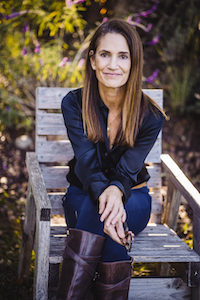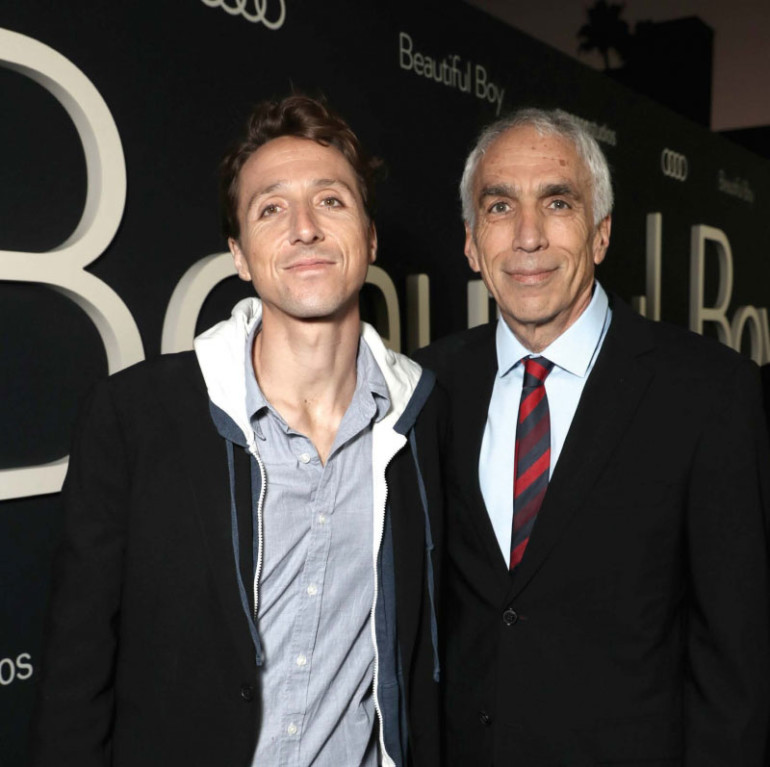GRAY-GREEN STRETCHES of rolling farmland, an oak-sheltered glass and redwood home, the broad white sand beaches of Point Reyes seashore — the film Beautiful Boy hits close to home, especially for those of us who live in Marin.
Based on the paired memoirs of journalist David Sheff (Beautiful Boy) and his son Nic Sheff (Tweak), the film is a portrayal of a father coping with his teen son’s addiction to methamphetamine and the addicted teen’s struggle not just to get sober, but to stay alive. David Sheff and his wife, Karen Barbour, moved to Marin almost three decades ago and raised Nic and their two younger children in West Marin. The film’s stars, Steve Carell and Timothée Chalamet, give powerful performances, all the more heart-wrenching for viewers who will recognize the roads, mountains, cliffs and coves of our beloved home county. The cinematic artistry of Beautiful Boy only elucidates the family’s experience of a living hell set in a magnificent natural world.
David and Nic Sheff, who is now 36 years old, eight years sober, and a television writer in Los Angeles, have their first collaborative project coming out this month. HIGH: Everything You Want to Know About Drugs, Alcohol, and Addiction (on sale January 8) is a resource for middle-school readers offering clear, direct information about the realities of drugs and alcohol. The father-son duo sat down to describe their extraordinary journey, from weathering the ravages and sorrows of Nic’s drug use to watching their lives portrayed on film to using their platform to educate and support others struggling with addiction.
What was it like watching your lives portrayed on film?
David: It was devastating. I knew the story, of course. We lived it. I wrote about it and Nic wrote about it, and for years we have talked about everything that happened to us. It’s not like there are any secrets or surprises, but watching it was different. The most painful was watching my son in hell and knowing that it was real.
Nic: Yes, it was super hard. Reliving everything felt so painful. But at the same time, it was an incredible reminder of everything we went through. It’s not that I forgot, exactly, but I’ve been sober eight years now and in some ways we’ve moved on; a lot of things have happened since our books came out, so just to be reminded of what we went through and how close we came to losing everything, and how far we’ve come … It was an amazing gift. I remember leaving the theater and besides thinking, “That was sort of weird and I can’t believe that happened,” I also did feel an acute sense of gratitude. I told the director, Felix van Groeningen, “I know you didn’t make it for this reason, but it really is a gift to me and I am grateful.”
Are you also grateful, David?
David: Yes, I think there’s a feeling of gratitude because we all have the sense that people connect with the story. The filmmakers — from the director Felix van Groeningen to the producers and the actors — they were committed to telling the truth about something that is often portrayed in clichés and stereotypes. I think people who haven’t been through an experience like this might not understand that we keep addiction a secret, that there is a stigma. People experience shame and guilt. It’s not like other diseases in that way. People feel like they’re alone and crazy dealing with addiction, and it seems they don’t feel quite as alone or crazy after seeing this movie. It’s beautiful in that way. Especially because the director shows how complicated addiction is, and that there are no easy answers, which is the experience of everyone who has gone through this.
Was there anything surprising about the film for either of you?
Nic: I was surprised by how much detail of our lives they really got right. The car I drove in the movie was just like the car I actually drove when I was that age, and the clothes I wore. My little brother Jasper worked on the movie as a production assistant and the production team saw his drawings and asked if he would not just help decorate my room in the movie, but also do the drawings for my journal. So in the scene when Steve Carell is looking through the journal what you see are my little brother’s drawings. It was so moving. It was like coming full circle.
Did you have any say in choosing the actors who played you?
Nic: The team came to us and said we want to bring this package to Steve Carell and my dad and I were both very excited about that idea. So Steve came on very early. Timothée didn’t come on until much later. The movie was set and ready to go and they were just looking for that actor. We weren’t involved in the audition process, but I will say that once I met Timothée I immediately felt that he was the exact right person for this role. He is so smart and was so committed to doing it right. I felt an immediate sense of trust, that he was doing it for the right reasons. I know my father felt that way about Steve too.
David: Oh yeah, for sure. And we must acknowledge the genius of Felix van Groeningen. Now the choice is a nobrainer, as Timothée Chalamet is the most lauded young actor of his generation, deservedly so, and is being compared even to James Dean. But it’s remarkable to remember that Felix found him before he was a big star, before Call Me By Your Name came out, before anyone knew who he was. Felix saw it: Timothée is a genius actor.
Nic: Yes, I think his is one of the most subtle and nuanced and complex portrayals of an addict by an actor that I have seen.
How did the setting of Marin County play into your story?
David: The part that is meaningful to us is that this is our home. My wife, Karen, and I first moved to Sausalito when Nic was 7. We can’t separate the story from our worlds here, throughout Marin, and especially West Marin — the beaches that are shown in the movie, the views that we see. We are very, very fortunate to have this around us. Nic grew up surfing the beaches here. The part of Marin that is nature is something that we’ve always been so appreciative of. It is part of us and part of our bond.
Nic: Marin is a specific community with unique problems, of course, but addiction is an equal opportunity destroyer and it doesn’t matter what economic or cultural background someone comes from; it affects everybody. That is something that is hard for people to understand. It feels like certain people should be immune. There is an assumption that people are using drugs because they’re being selfish or some sort of moral failing, but really it’s a brain disease, like a mental illness.
David: Yes, and anybody can get it. And people do get it; it’s a hard reality. We would like to think we can protect our kids, so we find the best schools, the safest communities. We feel this sense that if we get everything right our kids will be protected. What we learn is that we can try our best but there are some things that we just cannot protect our kids from. Our kids are growing up in a culture where drugs are everywhere — every high school in Marin, every high school in the Bay Area, and every high school in California and every high school in the country. Parents are struggling everywhere. You can’t find a place in the country that is not affected by drugs.
Are you surfing these days, Nic?
Nic: Yes! For me the amazing thing about getting sober and staying sober is getting my joy back — all these things that made me happy when I was young. Going on walks with my dogs, going to movies. Surfing is a huge part of that. My little sister and I go surfing almost every morning together. Those little things that make life worth living and make sobriety worth living for. I had lost the ability to feel joy through simple things and now to find that again has been a huge gift.
This article originally appeared in Marin Magazine’s print edition with the headline: “David and Nic Sheff”.

Kirsten Jones Neff is a journalist who writes about all things North Bay, with special attention to the environment and the region’s farmers, winemakers and food artisans. She also works and teaches in school gardens. Kirsten’s poetry collection, When The House Is Quiet, was nominated for the Northern California Book Award, and three of her poems received a Pushcart nomination. She lives in Novato with her husband and three children and tries to spend as much time as possible on our local mountains, beaches and waterways. For more on her work visit KirstenJonesNeff.Com.


